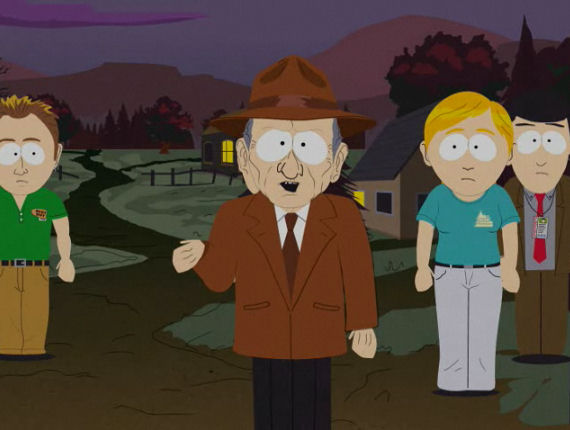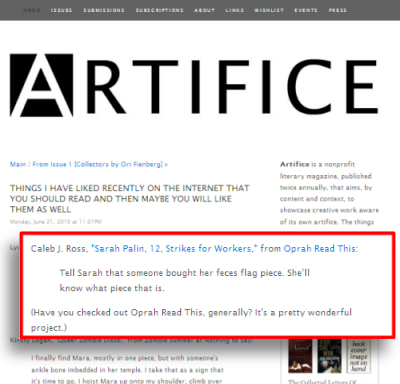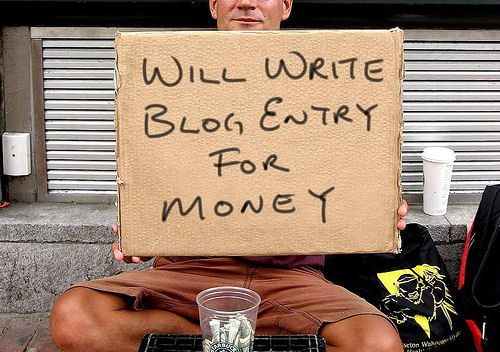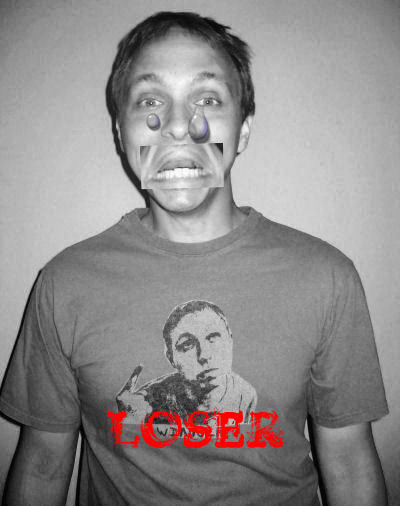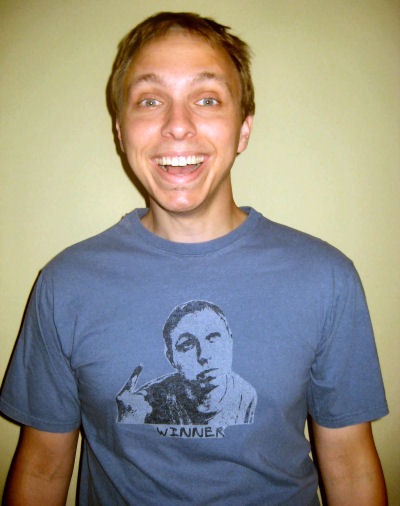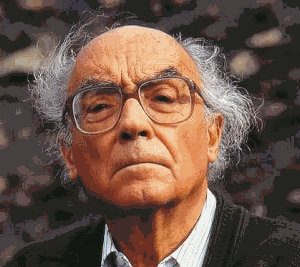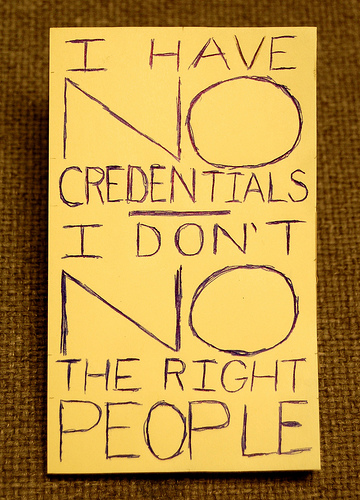(part of my ongoing Unexpected Literary References series) When watching a rerun of the "Britney's New Look" episode of South Park a few nights ago, I caught an allusion to the famous short story, "The Lottery," by Shirley Jackson (minute 16:36 in the clip here). Which makes me wonder, in what other unexpected places do literary references and allusions appear? Staying in the South Park world, there is the "A Dickens Classic" episode, which is an overt retelling of Charles Dickens' Great Expectations. More recently, The episode "The Tale of Scrotie McBoogerballs" is an extended commentary on Catcher in the Rye's controversial reputation. But beyond those borders, below are a few I remember (having been refreshed via a few internet searches). What others are there? The Simpsons ep Treehouse of Horror V | The "All work and no play makes Jack a dull boy," from Stephen King's novel, The Shining, is…
Posts By Caleb J. Ross
And I like you, Artifice Magazine. A bit more praise here for the Oprah Read This >> Oprah, Read This project.
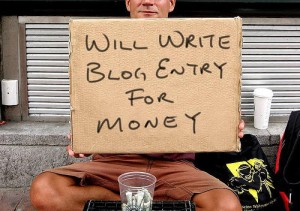 Disclaimer: I am far from a career author. I’ve made enough money to buy a few fifths of whisky and some diapers for my baby, so needless to say I’ve got a long way to go. The following plan reflects this outsider (re: possibly ignorant) perspective.
The idealized author spends his time alone, churning out typewritten manuscripts to meet constant deadlines. He drinks. Probably smokes. He’s respected. He vacations in tropical seclusion, but still, even with the changed view, he writes. He has no day job. He is an author. Writing puts his kids through college.
There is a reason this image contains a typewriter. Much like the machine itself, the idealized author is all but extinct. I think a lot of writers would like to go back to this model. Is it possible to not just retain the author career, but to make it thrive?
Given the following set of assumptions, I believe it would be possible to bring back the author career:
Disclaimer: I am far from a career author. I’ve made enough money to buy a few fifths of whisky and some diapers for my baby, so needless to say I’ve got a long way to go. The following plan reflects this outsider (re: possibly ignorant) perspective.
The idealized author spends his time alone, churning out typewritten manuscripts to meet constant deadlines. He drinks. Probably smokes. He’s respected. He vacations in tropical seclusion, but still, even with the changed view, he writes. He has no day job. He is an author. Writing puts his kids through college.
There is a reason this image contains a typewriter. Much like the machine itself, the idealized author is all but extinct. I think a lot of writers would like to go back to this model. Is it possible to not just retain the author career, but to make it thrive?
Given the following set of assumptions, I believe it would be possible to bring back the author career:
- Content will continue to outweigh consumption
- The marketplace is spoilt by free content, and much of that content will continue to be free
- eBooks/eReaders will be a primary content medium within the next decade
- The cost to produce and distribute market-quality products will continue to fall
- Consolidate the agent and publisher roles. Basically, this combined entity should act as a time and beaurocracy manager for authors. Today, authors have the ability to publish and distribute their own content without the help of agents and publishers. If this Pub/Agent composite can give authors time to write, then they will ultimately be given the sort of consistent product that the marketplace loves. Marketing thrives on trends. Giving authors time is the way to nurture trends.
- Increase author royalties. As media becomes electronic, the savings on overhead and distribution must be passed on. Court your talent, publishers. I’ve read the arguments against electronic media being cost-savers for publishers, and I just don’t believe them.
- Embrace the eBook paradigm shift. As a reader, I haven’t yet fallen in love with eBooks. As a writer, I am very excited by the possibilities. Instead of fighting to keep print alive, fight to make eBooks thrive. eBooks have the potential to increase the pool of readers, much as the iPod did for music enthusiasts.
- Brand yourselves as independent records labels do. Make fans out of your press, not just out of your authors. I won’t go into much depth here about this, but we do have an episode forthcoming at the Welcome to The Velvet podcast on this topic.
- Provide consistent and brandable content. As Dan Holloway says in the comments at Jane Smith’s How Publishing Really Works blog, “If you are writing for the art, by all means try your hand at getting an agent, but don’t be upset if you don’t get one – and if the feedback is that you should be more commercial in order to get one, then make the decision – do you want to write for the pay packet, or do you REALLY want to do it for the art? And if it’s the latter, don’t expect to be picked up, or blame the publishers when you aren’t.”
- Prove that you can provide that content. As Jane Smith says in a response to the above comment, “I think that a big reason that most writers make such a paltry amount is that there are lots of people out there who call themselves writers but who only really dabble with writing: they sell an article every now and then, take several years to write just one book; sure, they’re writers–but not full-time, serious writers.”. A career author must write as though it is a career.
As far as meeting this goal, I failed. I did not reach 5,000 print-quality words in one day. However, I did learn something very important. I am simply not meant to write all day. I am glad that I can no longer blame my non-productivity on time constraints. In fact, I actually work better given 2-3 hour windows. As you can see by the time-line below, the day started off quite well. 10:08a (1 word) first word (The), first cup of coffee (Soy Chai Latte with an extra shot – It’s like beer: start the night with something exotic so that when you are drunk later you don’t care what brand you are drinking). 11:08a (570 words) went to the bathroom, took in a chapter of Saramago’s The Stone Raft, and gave the dog a treat. She’s been really good about not killing me, considering I am not a daily…
When my lovely wife asked what I wanted for Father's Day, I replied quite simply: a day to myself. Fearing that the request may imply that my primary desire was to spend the day away from my family, I quickly explained that I wanted the day to write. I've been spoiled by the frantic life of parenthood, being able to blame my lack of productivity on the burdens of being a father. "Why haven't you finished the first draft of your world-changing novel?" my non-existent editor asks. "Well you see, sir, I have this child..." But I know the days of those lies must end. I only hurt myself when I don't get shit done. My beautiful wife has allowed me the entire day. I'll be spending the time at her parent's house where I can be assured just enough discomfort to keep me isolated to the page (they are…
Jose Saramago, who quickly became one of my favorite authors after I read Blindness just last year, has died. But damn, he had a fine run, producing some of the most amazing novels I've ever read. There truly is no writing like Saramago writing. I am lucky enough, however, to still have a robust back catalog of his work to dive into. In fact, just yesterday, I started The Stone Raft, and already, just 10 pages in, I'm hooked. Even stranger is that I began work on a novella a few weeks ago, that contains some Saramago-inspired passages. Now, I suppose, I'll be giving even more time to these sections to ensure they are worthy of their heritage.
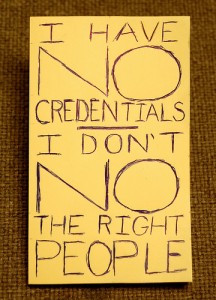 (this is more of a rant than a cohesive post. Also not a cohesive post: an ionic neutral road sign…oh, I went there, sirs and mams)
When I say that best-selling doesn’t mean best writing I understand the hipster ditch I dig. It sounds whiny and pretentious, all the more so when one realizes that nothing of mine is even close to best-selling. I’m not sure the word “best” could be put in front of any word and used to describe my work. Best tinder, maybe. Best use of paper bound by a cover bearing the name Caleb J Ross, perhaps. But someone could write my name on a phone book and it would be more “best” than my work. This ditch, though, it’s easy to dig, yet difficult to fill. But I will try.
When I say that best-selling doesn’t mean best writing, I’m really attacking the concept that commercial success defines artistic success. The Hitler example here would be Dan Brown’s DaVinci Code (“Hitler example” is a term I use to connote the extreme example; when someone wants to conceptualize something bad, Hitler is the go-to reference. Instead of explaining all of this, I should have just used a different term, maybe).
Many writers commonly denounce Dan Brown. While this may come off as petty jealously (we all want his money and readership), envy shouldn’t diminish the fact that his books are not well-written. Yes, they are great stories (those that I’ve read, I can vouch for), but they are not great writing. This is the divide between commercial and artistic success. Craig Clevenger, in an article for the Santa Barbara Independent (reproduced here at The Velvet) has much to say on Brown’s quality, even making the point that his prose is nearly indistinguishable from that of erotica, a genre accepted even by many of its authors as one meant for quantity over quality.
My point being, I suppose (see, even I don’t know if this thing has a point. I warned you), that it’s okay to voice your hate for a commercially successful book on terms of art. I think the key is to be able to back that opinion with a wide frame of reference. I would guess that the people who regularly and primarily read blockbuster novels (those by James Patterson, Stephenie Meyer, and Dan Brown for example) don’t often read other types, or many other, books. Therefore, they do not have a large enough frame of reference for measuring the quality of a book. So, those that may cite jealously as the source of any Brown-bashing, may be doing so without ever having experienced a truly well-written book.
Transformers might make tons at the box office, but film geeks know that The Machinist is a much better movie of humans vs. machine.
KC Masterpiece barbeque sauce sells truckloads around the county, but fat guys know that Cowtown is way better.
Or, shit, maybe people don’t care about writing and instead just want a story. That’s cool. As long as people are reading, I guess.
(this is more of a rant than a cohesive post. Also not a cohesive post: an ionic neutral road sign…oh, I went there, sirs and mams)
When I say that best-selling doesn’t mean best writing I understand the hipster ditch I dig. It sounds whiny and pretentious, all the more so when one realizes that nothing of mine is even close to best-selling. I’m not sure the word “best” could be put in front of any word and used to describe my work. Best tinder, maybe. Best use of paper bound by a cover bearing the name Caleb J Ross, perhaps. But someone could write my name on a phone book and it would be more “best” than my work. This ditch, though, it’s easy to dig, yet difficult to fill. But I will try.
When I say that best-selling doesn’t mean best writing, I’m really attacking the concept that commercial success defines artistic success. The Hitler example here would be Dan Brown’s DaVinci Code (“Hitler example” is a term I use to connote the extreme example; when someone wants to conceptualize something bad, Hitler is the go-to reference. Instead of explaining all of this, I should have just used a different term, maybe).
Many writers commonly denounce Dan Brown. While this may come off as petty jealously (we all want his money and readership), envy shouldn’t diminish the fact that his books are not well-written. Yes, they are great stories (those that I’ve read, I can vouch for), but they are not great writing. This is the divide between commercial and artistic success. Craig Clevenger, in an article for the Santa Barbara Independent (reproduced here at The Velvet) has much to say on Brown’s quality, even making the point that his prose is nearly indistinguishable from that of erotica, a genre accepted even by many of its authors as one meant for quantity over quality.
My point being, I suppose (see, even I don’t know if this thing has a point. I warned you), that it’s okay to voice your hate for a commercially successful book on terms of art. I think the key is to be able to back that opinion with a wide frame of reference. I would guess that the people who regularly and primarily read blockbuster novels (those by James Patterson, Stephenie Meyer, and Dan Brown for example) don’t often read other types, or many other, books. Therefore, they do not have a large enough frame of reference for measuring the quality of a book. So, those that may cite jealously as the source of any Brown-bashing, may be doing so without ever having experienced a truly well-written book.
Transformers might make tons at the box office, but film geeks know that The Machinist is a much better movie of humans vs. machine.
KC Masterpiece barbeque sauce sells truckloads around the county, but fat guys know that Cowtown is way better.
Or, shit, maybe people don’t care about writing and instead just want a story. That’s cool. As long as people are reading, I guess.

